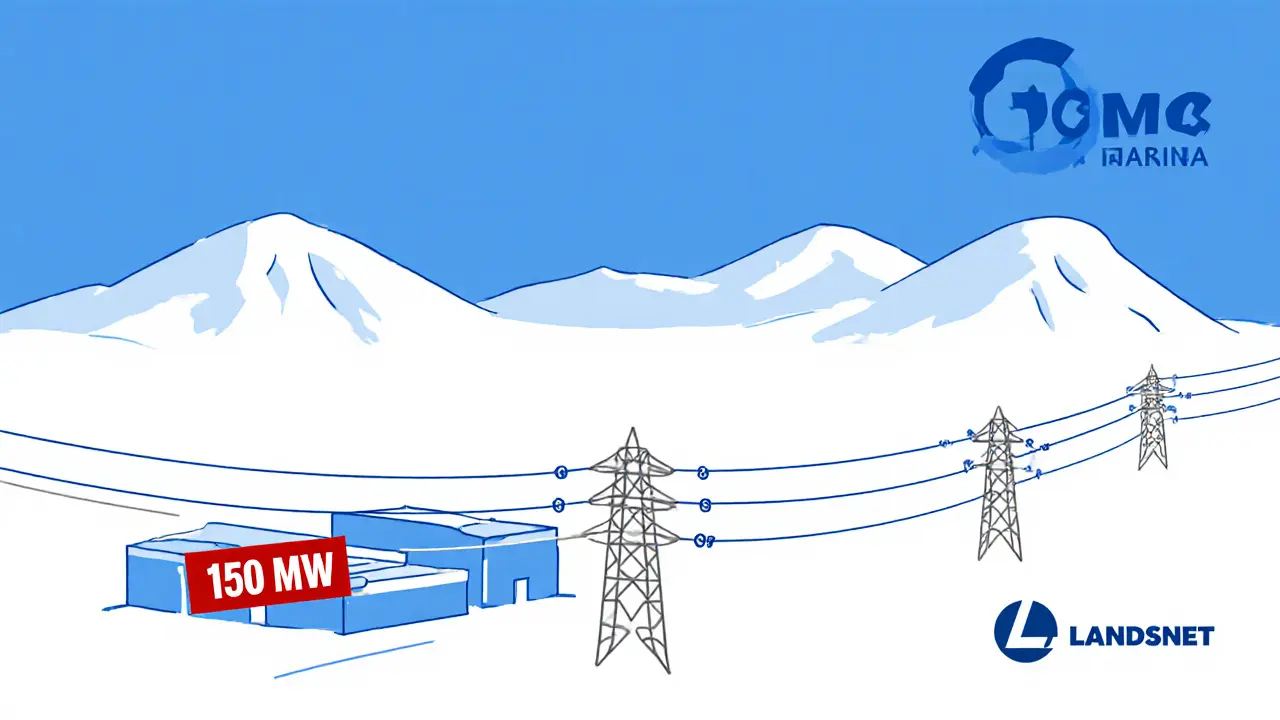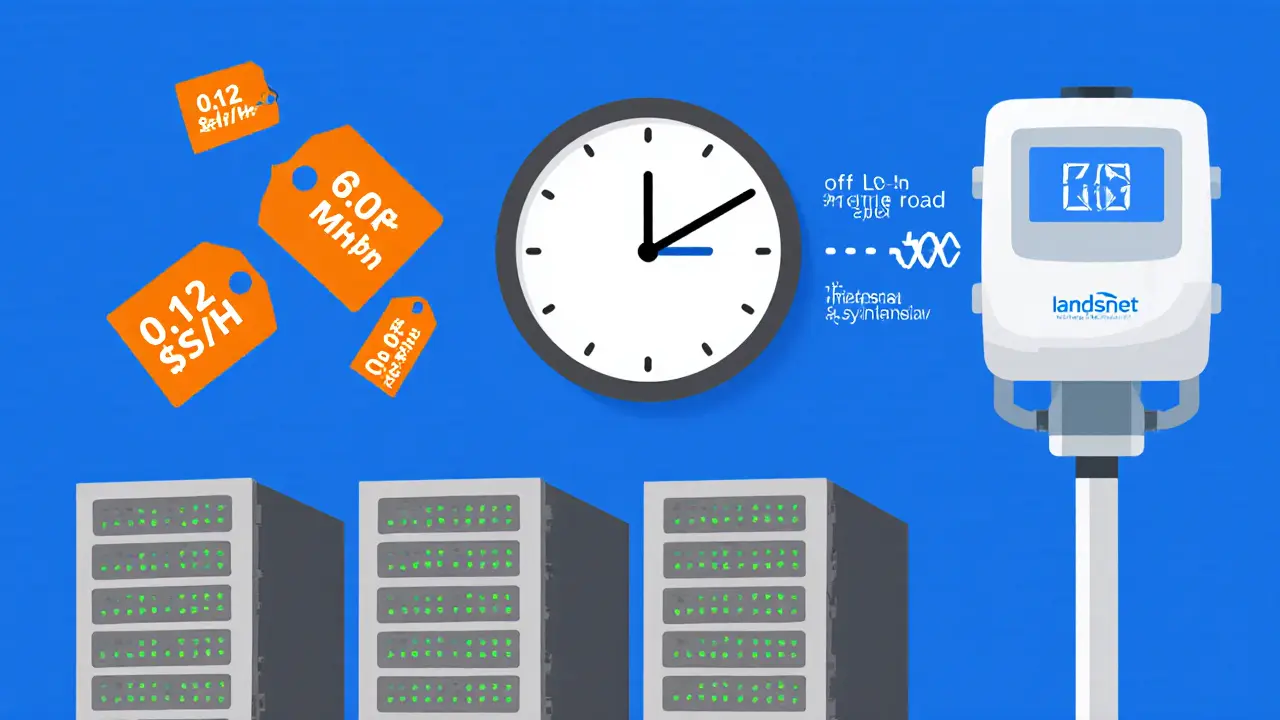Iceland Crypto Mining Restrictions: Power Company Limits in 2025
 Mar, 7 2025
Mar, 7 2025
Iceland Mining Profitability Calculator
How the New Rules Affect Your Profits
Iceland's power company Landsnet has implemented new restrictions that affect mining operations. Calculate your potential profit based on Iceland's dynamic pricing and power caps.
Estimated Monthly Profit
Revenue
Potential BTC mined: 0.0000
Total revenue: $0.00
Costs
Peak hours cost: $0.00
Off-peak hours cost: $0.00
Total monthly cost: $0.00
Estimated Monthly Profit: $0.00
Recommendation: To maximize profits, consider shifting 0 hours to off-peak periods. This could increase your monthly profit by up to $0.00.
When Iceland’s national power company Landsnet the state‑owned electricity grid operator began tightening crypto mining restrictions, the industry felt a sudden chill. The move marks the first time a utility has explicitly curbed mining power draws, shifting the conversation from generic energy policy to concrete, miner‑specific limits. Below we unpack what the restrictions look like, why they matter, and how miners can adapt.
Why Iceland Became a Crypto Mining Magnet
Iceland’s allure for miners stems from two natural advantages: abundant geothermal energy and sub‑zero ambient temperatures. In 2022, average electricity prices hovered around 0.06 USD/kWh, well below the global average, while the chilly climate cut cooling costs by up to 70 % compared with desert‑based farms. By 2025, Bitcoin‑related data centres accounted for roughly 90 % of the nation’s total data‑center power consumption, according to the Icelandic Energy Agency.
Government’s Policy Pivot in 2024
Until early 2024, the Icelandic government treated mining as a benign commercial activity. Prime Minister Katrín Jakobsdóttir publicly praised the sector for attracting foreign investment and boosting GDP. However, mounting reports that mining farms were consuming more electricity than the entire residential sector triggered a policy rethink. In March 2024, the government announced a suite of energy‑efficiency standards, mandating that any new mining operation must demonstrate a net‑zero carbon footprint within five years.
How Landsnet Enforced New Power Limits
Landsnet introduced three core mechanisms:
- Capacity Caps: Existing farms received a ceiling of 150 MW each, while new entrants must apply for a maximum of 30 MW.
- Dynamic Pricing: During peak demand hours (6 pm-10 pm local time), electricity rates surge to 0.12 USD/kWh for miners, encouraging load shifting.
- Real‑Time Monitoring: All mining sites must install smart meters that feed usage data directly to Landsnet’s control center; non‑compliant farms face automatic disconnection.
These measures are enforced through the Icelandic Financial Supervisory Authority (FSA), which can levy fines up to 5 % of annual revenue for violations.
Impact on the Biggest Players
Three major operators dominate the Icelandic landscape:
- Hive Blockchain Technologies - operates three farms totaling 210 MW. The company announced a 2025‑2026 expansion plan that trims new capacity to 25 MW per site to stay under the caps.
- Genesis Mining - suffered a 12 % hash‑rate drop after reallocating 40 MW of power to off‑peak slots.
- Bitfury Holding - invested €30 million in immersion cooling to reduce electricity draw, successfully keeping its usage under the 150 MW ceiling.
Collectively, these firms now account for roughly 70 % of Iceland’s mining hash‑rate, but all have pledged to meet the new standards or risk losing grid access.

Environmental and Social Ramifications
Iceland’s reputation as a renewable‑energy champion is at stake. The country’s total electricity generation is 99 % renewable-mostly hydro and geothermal. Yet mining’s disproportionate share threatens to crowd out domestic industry and raise public opposition. A 2025 poll by the University of Iceland found that 58 % of respondents support stricter limits on mining, citing concerns over grid stability and the nation’s carbon‑neutral goals.
On the positive side, the restrictions have spurred innovation: several farms are trialling immersive cooling and waste‑heat recovery for greenhouse heating, aligning mining with Iceland’s agricultural sector.
Future Directions: From Mining to Blockchain Services
Industry insiders predict a shift toward higher‑value blockchain activities such as staking services, decentralized finance (DeFi) infrastructure, and Central Bank Digital Currency (CBDC) research. The Central Bank of Iceland is currently evaluating a CBDC pilot, and it views Iceland’s secure, renewable grid as an ideal testbed. This strategic pivot could keep the country relevant in the crypto ecosystem while easing the strain on electricity resources.
Quick Checklist for Miners Operating in Iceland
- Confirm your allocated MW does not exceed 150 MW for existing farms or 30 MW for new projects.
- Install smart meters approved by Landsnet within 30 days of deployment.
- Schedule bulk of mining during off‑peak hours (00:00-06:00) to benefit from lower rates.
- Develop a roadmap to achieve net‑zero emissions by 2030 (e.g., immersion cooling, waste‑heat reuse).
- Maintain compliance documentation for the FSA to avoid fines.
Comparison of Pre‑2024 vs Post‑2024 Restrictions
| Aspect | Before March 2024 | After March 2024 |
|---|---|---|
| Maximum capacity per farm | No formal cap | 150 MW (existing), 30 MW (new) |
| Electricity pricing | Flat 0.06 USD/kWh | Dynamic rates; peak hours 0.12 USD/kWh |
| Monitoring requirements | Voluntary reporting | Mandatory smart‑meter data feed |
| Environmental targets | None specific to mining | Net‑zero carbon footprint by 2030 |
| Regulatory oversight | General energy regulation | FSA enforcement with fines up to 5 % revenue |
What Happens If You Violate the Rules?
Non‑compliance triggers a tiered response:
- First warning: 48‑hour notice to reduce load.
- Second breach: Automatic disconnection of the offending circuit.
- Repeated offenses: FSA imposes financial penalties and may revoke mining licences.
Most farms have opted for pre‑emptive upgrades rather than risk costly shutdowns.
Final Thoughts
Iceland’s crypto mining restrictions illustrate how a small nation can balance renewable‑energy leadership with emerging digital economies. By capping capacity, enforcing real‑time monitoring, and pushing for greener operations, Landsnet and the Icelandic government aim to keep the grid stable while still attracting blockchain innovation. Miners who adapt-by shifting loads, investing in cooling tech, or exploring new blockchain services-will likely thrive in the new regulatory climate.
What are the current MW caps for crypto mining in Iceland?
Existing farms cannot exceed 150 MW, while new projects are limited to 30 MW. These caps are enforced by Landsnet through smart‑meter data.
How does dynamic pricing affect mining profitability?
During peak hours (18:00‑22:00), electricity costs double, cutting margins. Miners offset this by running most hash‑rate during off‑peak hours (00:00‑06:00), where rates stay at the baseline 0.06 USD/kWh.
Do I need a special license to mine in Iceland?
No mining‑specific licence exists, but you must register the operation with the FSA and comply with anti‑money‑laundering rules. The key regulatory hurdle is electrical compliance with Landsnet.
Can I use waste heat from mining for other purposes?
Yes. Several farms now channel waste heat to nearby greenhouses, aligning with Iceland’s agricultural sector and helping meet net‑zero targets.
What penalties apply for violating power restrictions?
First violation triggers a 48‑hour load‑reduction notice. A second breach leads to automatic disconnection, and repeated offenses can incur fines up to 5 % of annual revenue and potential licence revocation.
Ron Murphy
October 25, 2025 AT 19:50The 150 MW cap on existing farms is brutal but fair. I’ve seen setups in Keflavik that were basically power sponges - no cooling, just brute force ASICs stacked like cordwood. Landsnet’s smart meter push is the only way to keep this from turning into an energy free-for-all. The dynamic pricing? Genius. Miners who don’t shift to off-peak are just burning money.
And the net-zero mandate? Honestly, most of these farms wouldn’t know carbon neutrality if it slapped them with a geothermal heat pump. But the ones investing in immersion cooling? That’s the future. Bitfury’s move is textbook.
Prateek Kumar Mondal
October 26, 2025 AT 18:42Iceland is doing the right thing. Mining is not a right it is a privilege. If you use the grid you pay the cost. No more free lunch. Off peak hours only. Smart meters. No exceptions. This is how small countries survive.
Nick Cooney
October 27, 2025 AT 00:02So let me get this straight… we’re telling miners they can’t just plug in and suck power like a vampire while the locals freeze because the grid’s maxed out… and somehow this is controversial?
Also the fact that someone thought ‘no cap’ was a good policy in a country with 370k people is honestly wild. Like you let a single family install a 2000 sq ft pool and then act shocked when the water bill hits 10k.
Also typo in the article - ‘net-zero carbon footprint within five years’ - wait that’s 2030? Which is it? Someone fix this before the FSA comes knocking.
Clarice Coelho Marlière Arruda
October 27, 2025 AT 10:00i read this and thought wow iceland is actually being smart?? like i thought theyd just let anyone mine cause they have geothermal but no theyre like nah we need to keep the lights on for actual people
also the waste heat thing is kinda cool? like turning bitcoin heat into tomato plants?? that’s the kind of weird innovation i love
Brian Collett
October 27, 2025 AT 20:11Anyone else notice how Hive Blockchain just scaled back their expansion instead of fighting it? That’s not surrender - that’s adaptation. The smart miners aren’t complaining about the cap, they’re building better cooling and moving to staking. This isn’t the end of crypto mining in Iceland - it’s the upgrade.
Also the FSA fines? 5% of revenue? That’s not a slap on the wrist. That’s a gut punch. They’re serious.
Allison Andrews
October 28, 2025 AT 18:42It’s fascinating how a tiny country with no army, no standing police force, and no fossil fuels became the unlikely referee of global crypto infrastructure.
This isn’t about regulating miners - it’s about asserting that energy is not infinite, even when it’s renewable. Iceland’s grid is a public good. Not a corporate buffet.
And yet… if you think about it, isn’t this the same tension that exists everywhere? Between innovation and sustainability? Between extraction and stewardship?
Maybe the real story isn’t the caps or the meters - it’s that a nation of 370,000 people just redefined what responsible tech looks like.
Wayne Overton
October 29, 2025 AT 11:38Why are we even talking about this
miners are just parasites
shut em all down
Alisa Rosner
October 30, 2025 AT 00:15HEY EVERYONE 😊 just wanted to say this is SO COOL 🌟 Iceland is being such a smart leader 🤗 they’re not just stopping mining - they’re REINVENTING it! 🚀
Waste heat to greenhouses?? YES PLEASE 🌱🍅 and dynamic pricing?? Genius! 💡
Also don’t forget - if you’re mining there, you MUST install Landsnet-approved smart meters or you’ll get CUT OFF 😱 and FSA fines are NO JOKE - up to 5% of your revenue!! 😮
Pro tip: Run your rigs 12am-6am! Cheaper, greener, smarter 💪❤️
MICHELLE SANTOYO
October 30, 2025 AT 01:06Oh so now it’s ‘responsible mining’? What a crock. You think these guys care about ‘net-zero’? They care about profit. This whole thing is just a PR stunt wrapped in geothermal smoke.
And don’t get me started on ‘blockchain services’ - staking? CBDCs? That’s just crypto trying to rebrand its corpse as a government contractor.
Iceland didn’t save the planet - they just got tired of being the world’s power bank for rich tech bros. Wake up. This isn’t innovation. It’s eviction.
Lena Novikova
October 30, 2025 AT 12:09Look everyone just chill the fuck out. The 150MW cap is fine. The 30MW for new ones? Perfect. Anyone who says otherwise is just mad because they got priced out. The smart meters? Necessary. The waste heat to farms? Brilliant. The net zero thing? You had 6 years to figure it out. Now do it or get out.
Stop crying about it. This isn’t a democracy. It’s a country with a grid. And the grid doesn’t care about your ASICs.